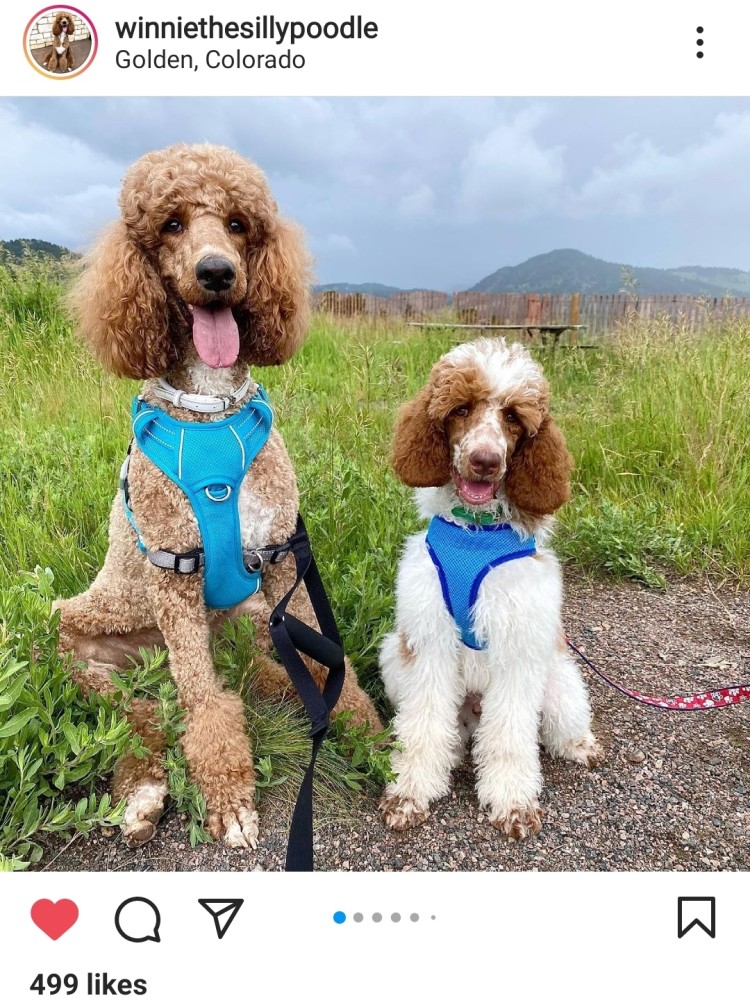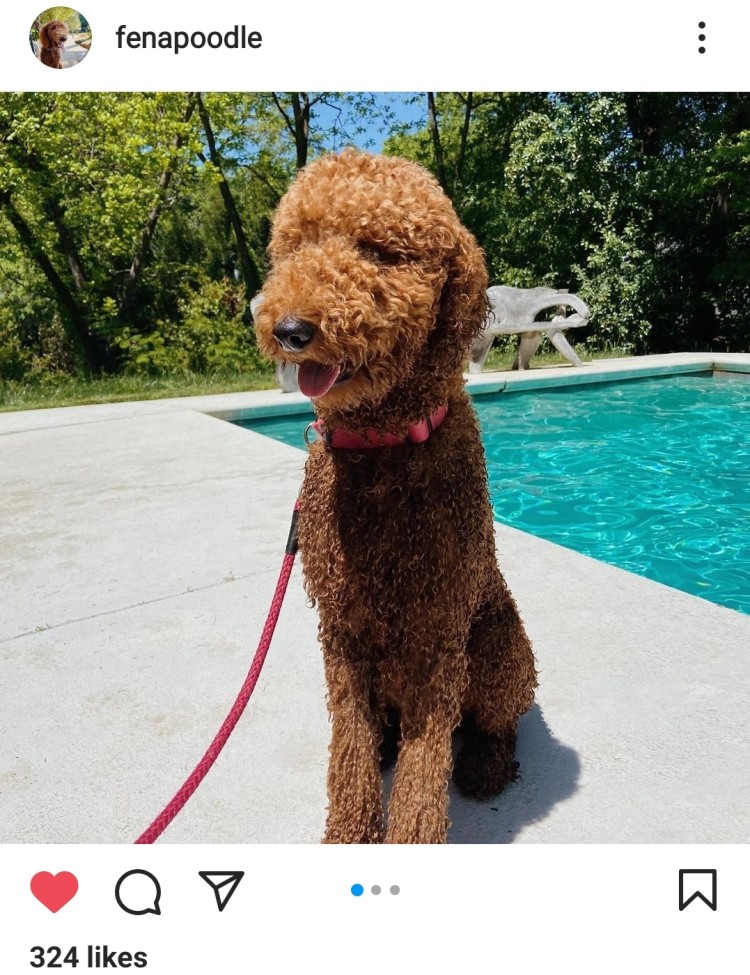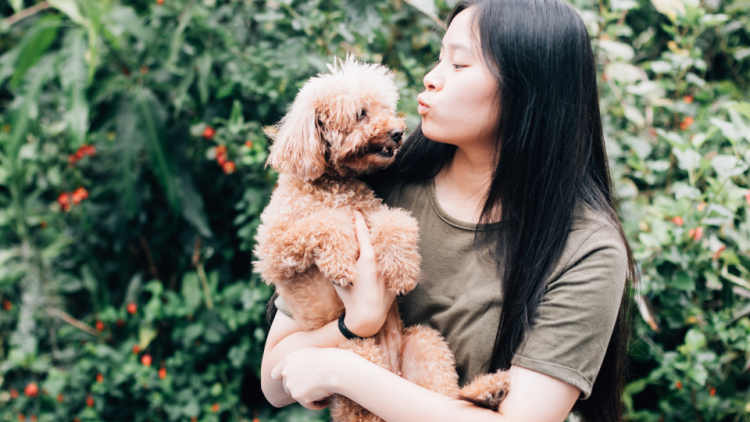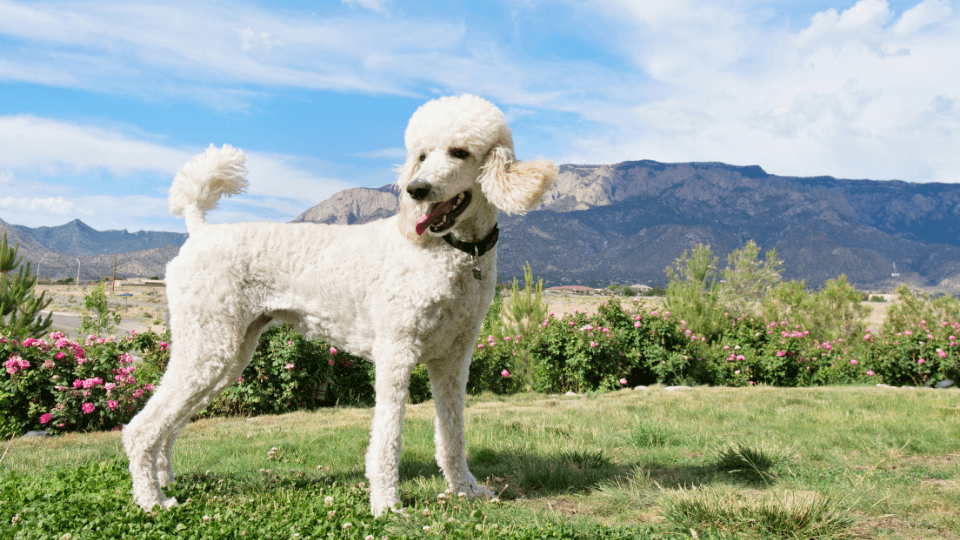Poodles are well known for their remarkable intelligence, love for swimming, and excellence in shows. This unique breed includes comes in many different colors and sizes, and often makes an excellent choice for people with allergies. That being said, without proper pet care, some Poodles have a reputation for excessive energy, bad behaviors, and common medical conditions.
Not sure if this is the right type of dog for you? Keep reading for a complete overview of the breed’s history, characteristic traits, unique needs, and more in our comprehensive Poodle care guide.
Table of Contents
- Poodle dog characteristics
- Poodle breed history
- Poodle care tips
- Common Poodle health issues
- Where to buy a Poodle
- Key Takeaways
- Frequently Asked Questions
Pro Tip: Pet insurance for Poodles can be beneficial because it requires a relatively small amount paid for monthly premiums, but can cover a large percentage of costs for unplanned vet care.
Poodle dog characteristics
Physical appearance
There are three types of Poodles:
- Standard Poodle: Also known as French Poodle, Barbone, Caniche, Chien Canard, and Grosse Pudel, was the first breed type to be developed. It’s a medium to large-sized breed, weighing between 45 and 70 pounds and measuring 15 inches in height or taller from the tallest point of the shoulders.
- Miniature Poodle: Mini Poodles are 10 to 15 inches tall and weigh between 15 and 17 pounds.
- Toy Poodle: Sometimes called Teacup Poodles, these dogs are the smallest in the breed lineup at 10 inches tall at the highest point of the shoulders and weighs from 6 and 9 pounds.
Pro Tip: Check out our Poodle size chart to monitor the growth of your dog to make sure they stay within the optimal weight range given their size.
All Poodle varieties share a square-like body, with a straight back and a long, elegant neck. They have long muzzles and dropped ears, as well as long legs and tails.
The coat is one of the defining features of this breed. Poodles have a single coat with a curly and corded appearance. They come in an array of 12 color variations:
- White
- Black
- Black & White
- Silver
- Gray
- Brown
- Blue
- Red
- Sable
- Apricot
- Cream
- Café-au-lait
Fun Fact: Parti Poodles come in a combination of these color varieties, with a primarily white coat and markings in another shade.

Poodles are most commonly recognized for their traditional hair clip. Despite popular belief, this clip is not only for visual appeal; it was originally developed to protect the dog’s joints and chest and keep them warm while working in cold water.
Poodles are low shedders and have hair instead of fur, they are considered low-allergy dogs. That being said, the breed is not 100% hypoallergenic, so if you or a family member has allergies, you may want to consider meeting your potential new pet before making a committment to bring them home.
Personality and behavior
Poodles are active, lively, intelligent, and easy to train. They love getting attention and can develop bad habits like nuisance barking if left alone without proper physical and mental stimulation each day.
It should be noted that Poodles are hunting dogs and require training and exercise in order to be at their best as companion dogs.
Poodles aren’t particularly territorial, which may make them bad watchdogs or poor guard dogs. However, when there’s a clear danger, they are quite protective of their homes and families. Without training and socialization poodles can be aggressive to other dogs and people outside the family.
Lifespan
The average Poodle lifespan is 12 to 14 years. Size is an important factor in canine life expectancy; small dogs tend to live longer than large breed dogs. This rule also applies across the classes of Poodle, as the average Poodle lifespan increases as they get smaller.
In addition to size, other factors that can impact lifespan include the health of your individual pet, the level of physical activity, diet, and the overall genetic health of the breed.
Fun Fact: The longest-living Poodle was a toy Poodle named Chichi who lived to the age of 24.
Poodle breed history
The breed was first developed as a duck hunting dog in Germany. More than four centuries ago, the Standard Poodle descended from the Barbet and the Hungarian Water Hound with the purpose of retrieving water foul on the hunt. Later, the breed’s many fine qualities made it popular among French nobility and, eventually, across all of Europe.
Fun Fact: Many people believe the Poodle originated in France, where it is the national dog of the country and known as the Caniche, or “duck dog.”
More recently, they were bred down into Mini- and Toy-sized varieties in the United States to become city-dwelling companion dogs. Although Standard Poodles are water dogs, these smaller variations are less likely to enjoy the water than their full-sized counterparts.

Poodle care tips
Training
As mentioned before, Poodles are easily trained. They’re smart, graceful, and likely to participate in activities such as tracking, obedience, and agility. They are also excellent water-retrievers and eager to please their owners. Fun, consistent routines should yield excellent results.
Exercise
All Poodle dogs are quite active and require daily exercise suited to their high energy level. Being originally bred as water-retrievers, Poodles love to swim and as hunting dogs, they also enjoy retrieving, so consider activities like tossing balls and sticks. They also love going for long walks and jogs.
Grooming
If your Poodle isn’t clipped in a short trim, they’ll need daily brushing and combing to prevent their coat from matting. If the hair gets matted near the roots, it may need to be shaved off by your veterinary clinic or groomer. For regular maintenance, you can either learn to clip your Poodle’s coat yourself or take them to a professional groomer every four to six weeks for clipping, grooming, bathing, and nail trim.
Nutrition
Like all dogs, Poodles need balanced nutrition. Their diet should be comprised of quality food adequate to their size, age, and activity level. Some members of the breed are prone to becoming overweight, so be sure to keep an eye on your pet’s daily calorie intake.
Treats can be very helpful when training your dog, but they should be given in moderate amounts. You can use pieces of your dog’s kibble as treats and remove the amount you used as treats from their next meal if you are concerned about your poodle’s weight. There are also low-calorie treat options including using raw vegetables such as chopped-up carrots or green beans. Avoid feeding table scraps and high-fat.
Talk to your vet to determine the best diet for your dog, daily caloric intake, and recommended feeding schedule. It’s also important to be mindful of the list of food dogs can and can’t eat.
Home life
These canines are very adaptable, so they’ll be happy regardless of whether they live in a large house with a yard or a small apartment in the city. As long as they have an opportunity to get outside to play, they’ll thrive in their environment. The most important thing, regardless of their living environment, is that Poodles have adequate physical and mental stimulation each day.
When properly socialized, Poodles are great with kids and make excellent family pets. However, they are prone to over-stimulation, so make sure your Poodle has a quiet place to retreat to if their environment gets too overwhelming.

Poodle health issues
These dogs are generally healthy, but as with other purebreds, there are certain hereditary risks. Some of the most common Poodle health issues include:
- Hypothyroidism
- Addison’s disease
- Canine hip dysplasia
- Gastric dilation volvulus (canine bloat, in larger poodles)
- Progressive retinal atrophy
- Cataracts
- Skin conditions
- Allergies
- Runny eyes
- Von Willebrand’s disease (inherited bleeding disorder)
- Epilepsy
Due to their long ears, Poodles are prone to ear infections, so it is recommended that you clean their ears on a regular basis with an ear cleaner that is either provided or recommended by your veterinarian.
Always make sure to get your Poodle from a reputable breeder who tests their puppies for common health issues and can provide parental history and medical paperwork.
Pro Tip: Poodles often have their share of health issues, which is why it’s a good idea to enroll in pet insurance conditions arise. Compare dog health insurance catered to your Poodle's unique needs now and save yourself from expensive vet bills in the future.
Where to buy a Poodle
Before bringing home a new puppy, be sure to research the dog’s genetic lines and confirm they come from good genes. Reputable breeders will provide you with health information for their puppies, as well as medical paperwork, certifications, and/or awards.
To buy or adopt a Poodle puppy, start by contacting these organizations:
If you’re interested in similar breeds, consider the Bichon Frise and Pomeranian because they are Poodle-like dogs in appearance. Those looking for a similar Poodle hunting dog that loves water can check out the Portuguese Water Dog.
Dog breeds mixed with Poodle
Many families choose Poodle mixes when selecting a new family member due to both the cross in characteristics, as well as the decreased risk of hereditary conditions common in purebreds. Based on popularity, some of the best Poodle mixes include:
- Golden Retriever Poodle mix (Goldendoodle)
- Labrador Poodle mix (Labradoodle)
- Bernese Mountain Dog Poodle mix (Bernedoodle)
- Portuguese Water Dog Poodle mix (Porti-doodle)
- Australian Cattle Dog Poodle mix (Aussiedoodle)
- Newfoundland Poodle mix (Newfypoo)
- German Shepherd Poodle mix (Shepadoo)
- Shih Tzu Poodle mix (Shih-Poo)
- Maltese Poodle mix (Maltipoo)
- Bichon Poodle mix (Bich-Poo)
- Cocker Spaniel Poodle mix (Cocke-Poo)
- Chihuahua Poodle mix (Chi-Poo)
- Husky Poodle mix (Huskypoo)
Before you start shopping for Poodle puppies or Poodle mixes, always remember that there are hundreds of displaced dogs in shelters that are in need of a loving home.
Key Takeaways
- Poodles come in three different size varieties: Standard Poodle, Miniature Poodle, and Toy Poodle. All Poodles have a distinctive dense and curly coat that barely sheds, which makes them great for people with allergies.
- Poodles are intelligent, energetic, and friendly. Originally bred as water retrievers, they enjoy activities that include getting in the water and retrieving things like sticks and balls.
- Poodles are easily adaptable, which means they’ll be happy in a large home with a backyard or an apartment. They are also great with kids and can become excellent family pets.
- Just like other dog breeds, Poodles are prone to certain health conditions such as Addison’s disease, hip dysplasia, eye diseases, and bloat.
- Always make sure to get your Poodle from a responsible breeder who tests their puppies for common health issues.
Frequently Asked Questions
Are Poodles good family dogs?
Yes, Poodles are fun, gentle, and loving, so they often make excellent playmates with kids. The breed prefers to be around people most of the time, but keep in mind that Miniature Poodles tend to be more high strung than Standard ones, and anxious dogs shouldn't be handled by small children. While great for families with allergies, nuissance barking may be problematic for families with infants in the household.
Are Poodles smart dogs?
Poodles are considered one of the most intelligent dog breeds. They consistenly earn blue medals in competitions and can act as clever tricksters around the house.
Are Poodles easy to train?
Yes, this breed displays an eagerness to please their owners. That, combined with their intelligence, is why Poodle service dogs are so common. They're frequently employed as guide dogs, therapy dogs, and assistance dogs for those with disabilities.
Are Poodles water dogs?
Yes, Poodles are water dogs because they were bred by design to retrieve fowl like ducks when hunting. Today, Poodle hunting dogs are much less common, but the breed still tends to display an innate love for swimming. Although most Poodles are strong swimmers, you should never assume their natural ability and always supervise your pet in the water. Keep in mind that some small dogs, including Toy Poodles, may not enjoy getting wet.
